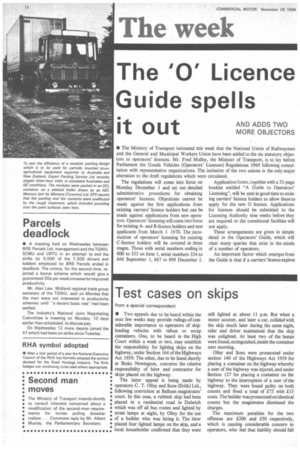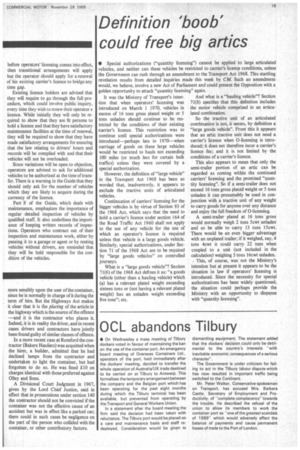Test cases on skips
Page 20

Page 21

If you've noticed an error in this article please click here to report it so we can fix it.
from a special correspondent • Two appeals due to be heard within the next few weeks may provide rulings of considerable importance to operators of skiploading vehicles with refuse or scrap containers. One, to be heard in the High Court within a week or two, may establish the responsibility for lighting skips on the highway, under Section 164 of the Highways Act 1959. The other, due to be listed shortly at Stoke Newington, concerns the relative
responsibility of hirer and contractor for skips placed on the highway.
• The latter appeal is being made by • operators C. T. 011ey and Sons (Erith) Ltd., following conviction at Balham magistrates' • court. in this case, a rubbish skip had been • • placed in a residential road in Dulwich • winch was off all bus routes and lighted by • street lamps at night, by 011ey for the use • • of a builder who was hiring it. The hirer • placed four lighted lamps on the skip, and a • local householder confirmed that they were still lighted at about 11 p.m. But when a motor scooter, and later a car, collided with the skip much later during the same night, rider and driver maintained that the skip was unlighted. At least two of the lamps were found, extinguished, inside the container next morning.
011ey and Sons were prosecuted under section 140 of the Highways Act 1959 for placing a container on the highway whereby a user of the highway was injured, and under Section 127 for placing a container on the highway to the interruption of a user of the highway. They were found guilty on both counts and fined a total of 175 with £.15 costs. The builder was prosecuted on identical counts but the magistrates dismissed the charges.
The maximum penalties for the two offences are £200 and /50 respectively, which is causing considerable concern to operators, who feel that liability should fall more sensibly upon the user of the container, since he is normally in charge of it during the
term of hire. But the Highways Act makes it clear that it is the placing of the article in the highway which is the source of the offence —and it is the contractor who places it. Indeed, it is in reality the driver, and in recent cases drivers and contractors have jointly been found guilty of similar classes of offence.
In a more recent case at Romford the contractor (Bakers Hauliers) was acquitted when the hirer, a builder, admitted that he had declined lamps from the contractor and undertaken to light the container, but had forgotten to do so. He was fined 10 on charges identical with those preferred against 011ey and Sons.
A Divisional Court Judgment in 1967, given by the Lord Chief Justice, said in effect that in prosecutions under section 140 the contractor should not be convicted if the container was not the effective cause of an accident but was in effect like a parked car; there could in such cases be negligence on the part of the person who collided with the container, or other contributory factors.
















































































































